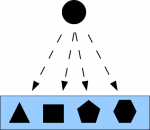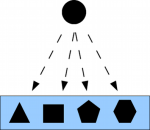Slides from talk on Partition Logic at University of Ljubljana Sept. 8, 2015.
On the Objective Indefiniteness Interpretation of Quantum Mechanics
Classical physics and quantum physics suggest two different meta-physical conceptions of reality: the classical notion of a objectively definite reality “all the way down,” and the quantum conception of an objectively indefinite type of reality. Part of the problem of interpreting quantum mechanics (QM) is the problem of making sense out of an objectively indefinite reality. Our sense-making strategy is to follow the math by showing that the mathematical way to describe indefiniteness is by partitions (quotient sets or equivalence relations).
Partitions and Objective Indefiniteness in Quantum Mechanics
The problem of interpreting quantum mechanics (QM) is essentially the problem of making sense out of an objectively indefinite reality–that is described mathematically by partitions. Our sense-making strategy is implemented by developing the mathematics of partitions at the connected conceptual levels of sets and vector spaces. Set concepts are transported to (complex) vector spaces to yield the mathematical machinery of full QM, and the complex vector space concepts of full QM are transported to the set-like vector spaces over ℤ₂ to yield the rather fulsome pedagogical model of quantum mechanics over sets or QM/sets.
Introduction to Partition Logic
This is an introductory treatment of partition logic which also shows the extension to logical information theory and the possible killer application to quantum mechanics.
Introduction to Logical Entropy
This paper, a reprint from the International Journal of Semantic Computing, introduces the logical notion of entropy based on the newly developed logic of partitions that is mathematically dual to the usual Boolean logic of subsets (aka “propositional logic”), and compares it to the usual Shannon entropy.
The Logic of Partitions: Introduction to the Dual of the Logic of Subsets
Partitions on a set are dual to subsets of a set in the sense of the category-theoretic duality of epimorphisms and monomorphisms. Modern categorical logic as well as the Kripke models of intuitionistic logic suggest that the interpretation of classical “propositional” logic should be the logic of subsets of a given universe set. The propositional interpretation is isomorphic to the special case where the truth and falsity of propositions behave like the subsets of a one-element set. If classical “propositional” logic is thus seen as the logic of subsets of a universe set, then the question naturally arises of a dual logic of partitions on a universe set. This paper is an introduction to that logic of partitions dual to classical “propositional” logic.
Counting Distinctions
This paper gives the logical theory of information that is developed out of partition logic in exactly the same way that Boole developed logical probability theory out of his subset logic.
The Objective Indefiniteness Interpretation of Quantum Mechanics
The purpose of this blog entry is to briefly describe a new interpretation of quantum mechanics (QM). A long paper introducing this objective indefiniteness interpretation is available at the Quantum Physics ArXiv and (a more recent version) on my website.
History of the Logical Entropy Formula
The logical entropy formula Given a partition on a finite universe set U, the set of distinctions or dits is the set of ordered pairs of elements in distinct blocks of the partition. The logical entropy of the partition is the normalized cardinality of the dit set: . The logical entropy can be interpreted probabilistically […]





